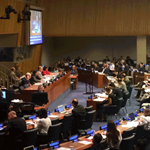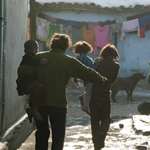Published on Mon, 2017-09-04 07:49
When Hungarian government officials talk about implementing the SDGs they mean less public expenditure in social sectors. Between 2010 and 2015 the Orbán government on the one hand increased state expenditures, doubled spending on the economy, and significantly increased spending by allocating about US$ 340 million annually on sports, mainly for building football stadiums. On the other hand, it decreased expenditures on public health, education and pensions. The government did not save only on pensioners, but also on unemployment benefits, by decreasing their size and duration even when they were taking place on an insurance basis. These measures decreased annual family support expenditures as well, which can be explained by a decrease in the number of children and the decades-long freeze in services. Social benefits were decreased, while extreme poverty increased over the past eight years. |
Published on Thu, 2017-08-31 13:36
Growing global interdependence poses greater challenges to policymakers on a wide range of issues and for countries at all levels of development. Yet, the new mechanisms and arrangements put in place over the past four decades have not been adequate to the growing challenges of coherence and coordination of global economic policymaking. Recent financial crises have exposed some such gaps and weaknesses. |
Published on Thu, 2017-08-31 12:30
Following 8 days involving 43 Voluntary National reviews (VNR) and 147 side events with 77 ministry-level participations and 2458 registered stakeholder representatives, the statistical outlook of the 2017 High-Level Political Forum on Sustainable Development Goals is quite promising. It is only the second review and just two years after the kick-off for the implementation of a universal agenda towards leaving no-one behind. Yet, time is marching on and there is a long way to go on the level of implementation. At the 2017 HLPF, Jordan became the third country from the Arab region to participate in the VNR process; following Egypt and Morocco in the 2016 review. The first words of Jordan’s national report made reference to the same issues: ‘the power of working together’ and taking into consideration ‘the urgent world issues’. |
Published on Wed, 2017-08-23 09:46
Guatemala should abandon the old patterns of ‘development’ based on the extraction of natural wealth, environmental predation and exploitation of cheap labour, and turn its gaze towards more creative and inclusive forms of production, promote democracy and make the distribution of wealth and political power more equitable, recommends the civil society report on the SDGs contributed by Helmer Velasquez and Arlyn Jimenez of the Coordination of NGOs and Cooperatives of Guatemala (CONGCOOP). |
Published on Wed, 2017-08-23 09:21
Bulgaria is the poorest EU member state, with almost half of its children living in low-income households and more than half of elderly people with pensions below poverty line. The Bulgarian Gender Research Foundation (BGRF) and Bulgarian Social Watch coalition report that policies shaped by EU priorities and advice provided by the IMF and the World Bank declare as their fundamental purpose “the struggle against poverty”, but "they keep on demanding economic reforms which have proved to be totally inefficient". The leading assumption is that only the free market and strictly restricted government intervention can guarantee prosperity. Once adopted, "no one measures whether the welfare of people has improved, but only to what extent the recommended neoliberal policies have been implemented". |
SUSCRIBE TO OUR NEWSLETTER







